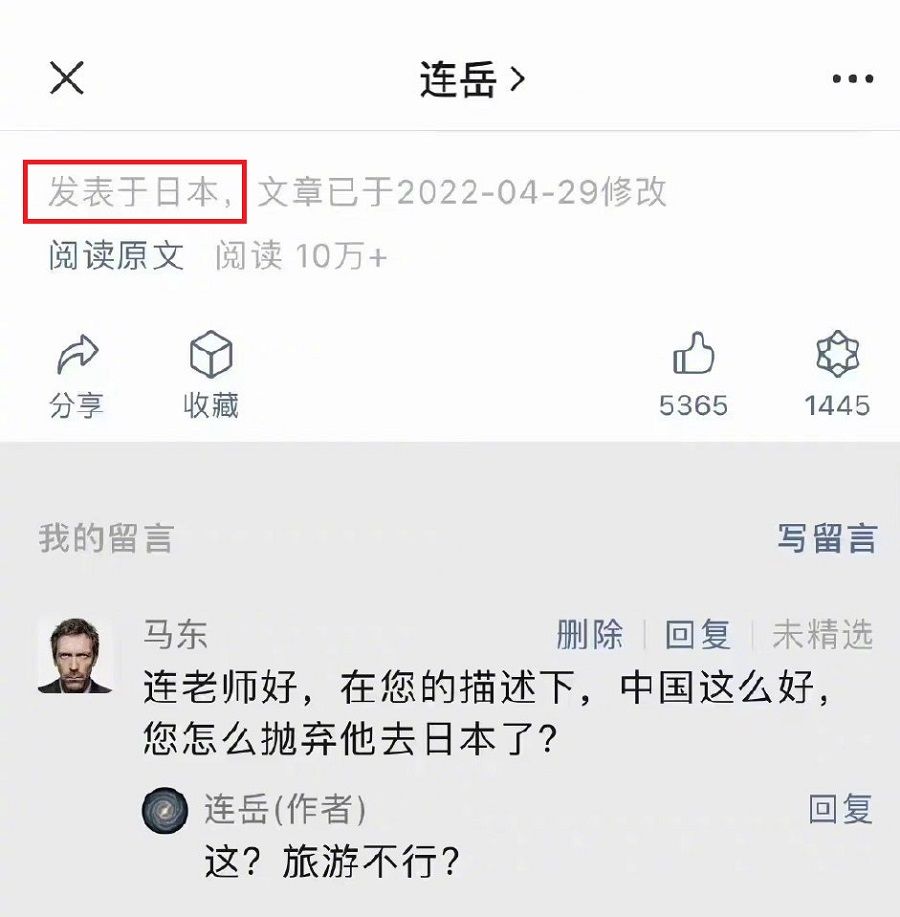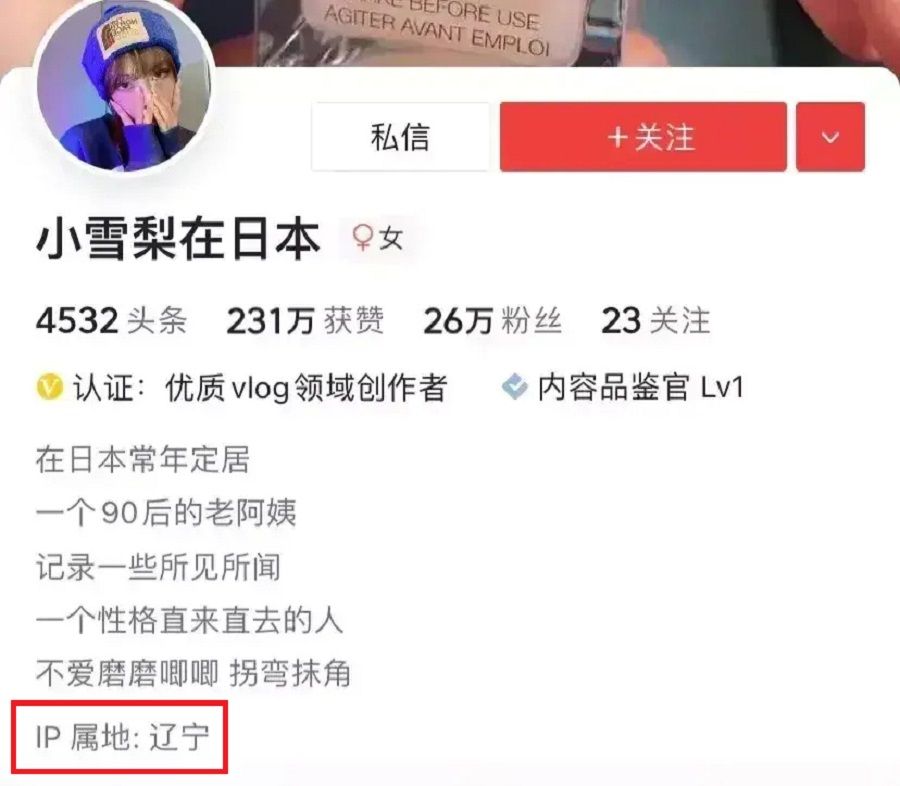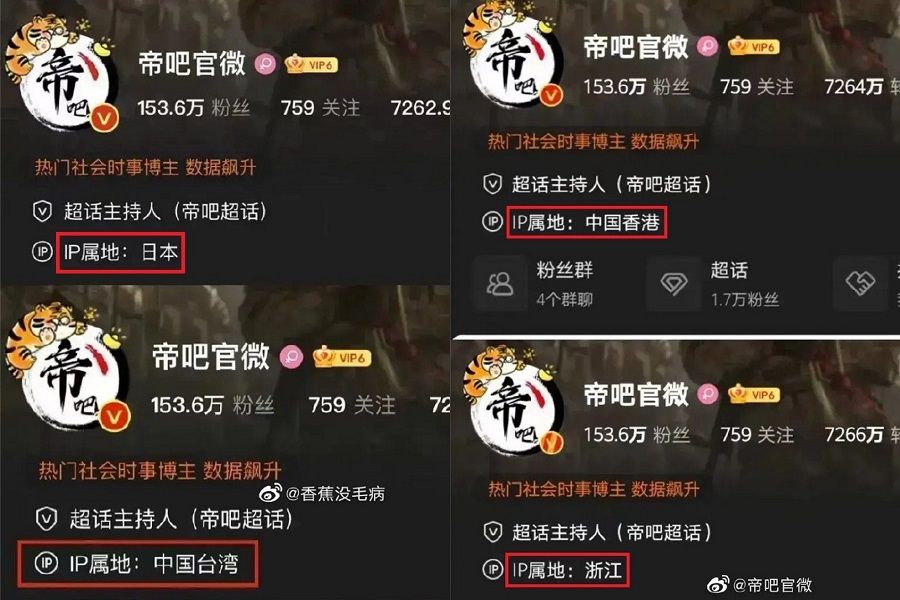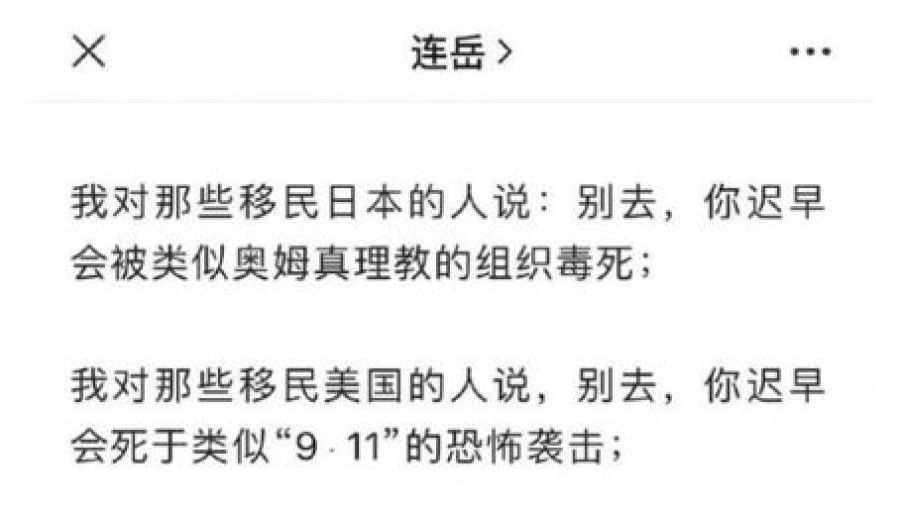Patriotism has become a commodity on Chinese social media

The patriots are based overseas; those 'living overseas' are trapped behind the Great Firewall of China.
The above effectively sums up a bizarre phenomenon that has come to light since Chinese social media platforms such as Weibo, Douyin, WeChat, Zhihu, Douban and Xiaohongshu introduced a new policy to display the location of users based on their internet protocol (IP) addresses.
It turns out that the patriotic "Big Vs" (大V, verified internet personalities) are not even in China, while other Big Vs who attract views by posting content about life overseas are living in China instead.
The Chinese social media regulation to display IP addresses has inadvertently exposed the inconsistencies between location and content, which was not the original intention.
Weibo issued a notice stating that the new settings are designed to "reduce bad behaviour such as online impersonation, malicious disinformation, traffic manipulation" and so on. This measure is currently only limited to verified personal accounts - the accounts of the Chinese government, state media and other organisations are not affected.
Image of patriotic 'Big Vs' gone south
Weibo first announced that it would show the IP addresses of users that post original content related to Russia's invasion of Ukraine. It later announced on 28 April that it would extend this measure to all posts and comments on the platform.

However, the measure, which was seen as a way to prevent foreign cyber armies from inciting public opinion, has unintentionally dealt a big first blow to the image of patriotic Big Vs.
Lian [Yue] often posts content about patriotism, opposing migration and dismissing Japan. It thus came as a surprise that his IP address shows that he is in Japan.
Based on lists compiled by netizens, we-media (online news sources operated by individuals or collectives, who are often amateurs) and overseas media, the patriotic Big Vs with conflicting IP addresses and content include Chinese writer Lian Yue (连岳), who allegedly has several million followers on social media; Li Yi Bar (帝吧), a subforum of the Baidu Tieba forum that had once flooded Taiwan President Tsai Ing-wen's Facebook; and Chinese actor Wu Jing (吴京) who starred in Wolf Warrior and other patriotic films.
Lian often posts content about patriotism, opposing migration and dismissing Japan. It thus came as a surprise that his IP address shows that he is in Japan. Lian admitted that he was in Japan for a holiday but later claimed that he was travelling on a medical visa with his family. He shared that he would return to China in the next month and would "stay in his beloved Fujian". He asserted, "I was born a Chinese and will die a Chinese ghost. This will always be true."

Li Yi Bar, which often engages in a war of words with Taiwanese netizens, has battled against "foreign forces" numerous times. But the IP address of this subforum, which often claims that Taiwanese cyber armies have brought great harm to the motherland, is actually in Taiwan. That is to say, Li Yi Bar is itself part of the "Taiwanese cyber army". Reportedly, after the controversy came to light, Li Yi Bar's IP address was quickly changed to Hong Kong, Japan and Zhejiang.
Meanwhile, Wu most likely became collateral damage when his IP address showed that he was in Thailand. Reports jumped to his defence, saying that he was filming Meg 2: The Trench in Thailand and would be back in a few weeks after wrapping up the shoot.
... internet celebrities Xiaoxueli in Japan (小雪梨在日本) is actually based in Liaoning, Lili Ma in France (莉莉妈在法国) in Henan, and Laijiang in Tokyo (来酱在东京) in Shanghai, among others.
Fans defend internet celebrities abroad
In contrast to the patriotic Big Vs who were found to based overseas, internet celebrities who often brag about their high lives abroad were discovered to be actually living in mainland China. Based on checking their IP addresses, Taiwan's Mirror Media reported that internet celebrities Xiaoxueli in Japan (小雪梨在日本) is actually based in Liaoning, Lili Ma in France (莉莉妈在法国) in Henan, and Laijiang in Tokyo (来酱在东京) in Shanghai, among others.

Fans defended these internet celebrities, saying that they could well be overseas but their accounts are managed by their mainland Chinese companies. The bloggers are only responsible for filming content overseas, while their company in the mainland releases them. However, some online articles pointed out that such marketing accounts operating behind the guise of personal lifestyle accounts are detestable.
In the 1990s, a famous quote from The New Yorker said, "On the Internet, nobody knows you're a dog." The virtuality and anonymity of the emerging internet back then allowed people to stay completely hidden online.
But following the development of various search engine technologies in addition to IP address information, the transparency of internet platforms has significantly increased and the idea of anonymity is now a thing of the past.

Compulsory displaying of IP locations on Chinese social media platforms has revealed the true nature of many accounts, and resurfaced the controversy over "overseas patriotism" (离岸爱国) - referring to the Chinese who act particularly patriotic only after leaving China.
Patriotism as a business
Some commentators said that the hypocrisy in overseas patriotism comes from the fact that the writer is defending China's policies but they are not in China, so they are not directly exposed to the political and economic pressures and burden of these policies. The current IP address debate is centred on the Big Vs who advocate patriotism but are based overseas, causing their credibility to fall overnight.
Chinese columnist Wang Wusi incisively mocked Lian on Twitter, "In the old days, people watched fires from the other side of the river; now, people can be patriotic from overseas. Lian Yue never concealed anything, it was just that all of you do not know your hanyu pinyin - Lian (连, lian) is li'an (离岸, overseas)."

WeChat account Cicero by the Sea (海边的西塞罗) dug up Lian's past writings, one of which said, "I tell those migrating to Japan: don't go, sooner or later you'll be poisoned by groups such as Aum Shinrikyo. I tell those migrating to the US: don't go, sooner or later you'll die in a September 11-style terrorist attack."
Mocking Lian's high-profile patriotism, Cicero by the Sea noted that Lian's "pretence" continued until 29 April 2022 when IP addresses were revealed, "and then suddenly he couldn't carry on the pretence anymore".
However, there are Lian's supporters who feel that "being in Japan does not mean that he is not patriotic, or that he cannot persuade others to be patriotic, does it?"

Responding to netizens' criticism, Lian wrote "Why Am I in Japan?" (《我为什么在日本?》) and ended the essay by saying that his public account would not be updated from 1 to 4 May. (N.B. As of 17 May, Lian Yue's Weibo account remains inactive, while his WeChat account is active. The article "Why Am I in Japan?" does not appear on his main WeChat page and can only be found through the search function.)
Netizens pointed out that for each day that Lian does not update his account, he loses money. And judging by his explanation of why he was in Japan after his IP address was made known, he still intends to make money in China.
By writing patriotic articles for the sake of gaining online traffic and benefitting themselves and their own pockets, these two-faced "patriots" are treating patriotism as a business while fooling their followers.
Cicero by the Sea's essay described Lian as an internet celebrity running a "patriotism business"; all those patriotic essays were written to attract daily traffic and rewards from fans, as well as to sell merchandise - the basic sources of income for public accounts.
Whereas in the past, it was possible to make money by pretending to be a "public intellectual", today, one has to be a "patriot". From Weibo comments and WeChat essays, netizens are clearly unhappy that "patriotic Big Vs" such as Lian wrote so many articles criticising Japan and the US while living overseas. By writing patriotic articles for the sake of gaining online traffic and benefitting themselves and their own pockets, these two-faced "patriots" are treating patriotism as a business while fooling their followers.
... there is no way to manually change IP addresses on Weibo without changing the physical location.
Trending search: how to change IP address
IP addresses have become the magic mirror that reveals falsehoods and impersonations, reining in the unscrupulous and vicious behaviours of keyboard warriors, who may be foreign "anti-China forces" inciting trouble, or "patriots" and celebrities displaying duplicitous behaviour.
Interestingly, various searches on how to change IP addresses have come up on Baidu, showing that many netizens are interested in the topic. Currently, there is no authoritative answer, but a number of websites have said that there is no way to manually change IP addresses on Weibo without changing the physical location.

IP addresses are a unique set of numbers assigned by internet servers to each electronic device that is connected to the internet. Weibo stated that the location is determined based on the user's most recent IP address when posting, commenting or voting. However, it does not say whether using a virtual private network (VPN) would affect the accuracy of the location information.
Taiwan media reported that IP addresses can be changed through a VPN connection. United Daily News cited a senior cybercrime investigator saying that internet users in mainland China who want to hide their tracks can use VPN services to bypass the Great Firewall and connect to websites through servers in different countries and regions. That way, the IP address will not show as mainland China.
If these attempts work, it will lead to a long-drawn-out game of cat and mouse with the authorities, which proves in itself that there is a need for regulation, despite people's concerns about privacy.
A commentary in the Yangcheng Evening News highlighted that behind the fake front of an IP address is a real person, and strengthening the link between the virtual and real worlds is beneficial to improving self and all round discipline, cleaning up the online environment and maintaining online order.
To ensure that social media platforms disseminate true information, everything that happens - from frontend to backend operations - must be transparent.
Only when the tide goes out do you discover who's been swimming naked and who is truly patriotic.
